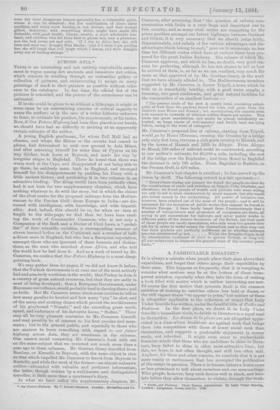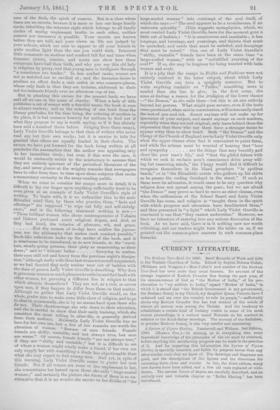A. FASHIONABLE ESSAYIST.*
IT is always a mistake when people place their aims above their capabilities, and forget that others gauge their capabilities by their aims. This happens so frequently, that it is tempting to consider what motives may lie at the bottom of these trans- parent mistakes, especially when they take the form of writing a book filled with matter which is neither interesting nor new. Of course the first motive that presents itself is the common ambition of desiring to outshine others less bold or fluent, or the still vaguer desire " to appear in print," but neither of these is altogether applicable to the collection of essays that Lady Violet Greville has written, under the fanciful title of Faiths and Fashions. In the first place, we doubt if, in Lady 'Violet Greville's immediate circle, to dabble in literature is a royal road to distinction. Les dames de la plume are not altogether appre- ciated in a class whose traditions are against work that brings them into competition with those of lower social rank than themselves, and suggests a pardonable enjoyment in money made, not inherited. It might even occur to uncharitable feminine minds that those who are ambitious to shine in litera- ture, have failed to shine in other more attractive lines ; but this, we hope, is not often thought, and still less often said. Anyhow, for these and other reasons, we conclude that it is not mere vanity or restlessness that has prompted the publication of the essays in question. There is in human nature a desire more or less prominent to talk about ourselves and our surroundings. Wise people, however, keep such desires well in check, and hesi- tate before they allow themselves to violate, through the weak- * Faiths end Fashions. Short Essays, republished. By Lady Violet amino. London Long mans, Green, and Co. 1580.
ness of the flesh, the spirit of reserve. But in a class where there are no secrets, because it is more or less one large family circle, inheriting the inherent right which belongs to all family circles of saying unpleasant truths to each other, neither reserve nor unreserve is possible. Your secrets are known before they are told, and your views on life are judged by your actions, which are sure to appear, to all your friends in quite another light than the one you could wish. Innocent little comments on motives and conduct fall flat and tame when tiresome sisters, cousins, and aunts can show how those comments have had their birth, and why you say this old lady is religious by proxy, and that young man is irreligious through "a conscience too tender." In less exalted ranks, women are not so watched nor so cavilled at ; and the feminine desire to produce an effect finds a safe outlet in wise common-places, whose only fault is that they are truisms, addressed to their not too intimate friends over an afternoon cup of tea.
But in pleading this excuse for the present book, we have said all we can in the name of charity. When a lady of title publishes a set of essays with a fanciful name, the book is sure to attract readers ; and as the ordering of one book from the library precludes, for the time being, the ordering of another in its place, it is but common honesty for authors to find out if what they propose to say is worth saying, or if it has already been said nhundred times before. ;fudging from these essays, Lady Violet Greville belongs to that class of writers who never read any but their own works ; but it is unwise to take for granted that others are equally limited in their choice. The excuse we have put forward for the book being written at all precludes the assumption that the author was appealing only to her immediate circle ; but even if this wore the case, it would be eminently unfair to the aristocracy to assume that they are entirely ignorant of the periodical literature of the day, and never glance at the weighty remarks that newspapers have to offer from time to time upon those subjects that excite ainomentary curiosity in the essay-reading public.
When we come to consider the essays more in detail, it is difficult to lay our finger upon anything sufficiently fresh to be even given as an example of Lady Violet Greville's style of writing. To begin with, it is no unfamiliar idea to the anti- Ritualist mind that, by those who practise them, " fasts and offerings " are supposed " to wipe out folly and self-indulg- ence ;" and in the following statement nothing is new Those brilliant women who shone contemporaries of Voltaire and Diderot professed scant religious dogma, and died, as they had lived, the votaries of pleasure, wit, and grace.
But the women of to-day have neither the joyous- ness nor the philosophy that makes such conduct possible." 'Such-like reflections make up the matter of the book, and it is wearisome to be introduced, as to new friends, to the "excel- lent, steady-going persons, their piety as unassuming as their dress ;" and to " delicate ladies hurrying to matins, their eyes still red and heavy from the previous night's dissipa- tion," although really with these last we are not so well acquainted, as we had fancied that early matins were out of fashion with the class of person Lally Violet Greville is describing. Why does
it give some women so much pleasure to criticise and find fault with other women, for pursuing a different line in religion to that which attracts themselves ? They are not, as a rule, so severe • upon men, if they happen to differ from them on that matter. Although we gather that Lady Violet Greville would, on the whole, prefer men to make some little show of religion, and to go
to church occasionally, she is by no means hard upon those who do not. Their shortcomings she sets down to their education,
and she is careful to show that their early training, which she
considers the most telling in after-life, is generally derived from their mothers. Evidently Lady Violet Greville has uo
love for her own sex, but a few of her remarks are worth the
attention of women. " Beware of men friends. Female friends are shifty, unstable, and not always true, but men
are worse." Of course, female friends " are not always true,"
if they are " shifty and unstable ;" but it is difficult to see of whom a woman might wisely make a friend, if her own sex
only supply her with something a shade less objectionable than what she may expect to find among meu. And yet, in spite of this warning, Lady Violet Greville seems to prefer her men friends. But if all women are more or less unpleasant to her, she concentrates her hatred upon those she calls " large-souled women ;" and certainly the picture she draws of them is so un- attractive that it is no wonder she carries ou her dislike of " the large-souled woman " into contempt of the soul itself, of which she says :—" The soul appears to be a troublesome, if an unknown quantity." (This suggests metaphysics, which, we must remind Lady Violet Greville, have for the moment gone a little out of fashion.) "It is omnivorous and insatiable ; it has longings, and burnings, and yearnings, and thirsts that must be quenched, and needs that must be satisfied, and droopings that must be raised." Can one of Lady Violet Greville's "shifty, unstable" friends have been at the same time "a large-sonled woman," with an " unfulfilled yearning of the soul P" If so, she may be forgiven for being wearied with both women and souls.
It is a pity that the essays in Faiths and Fashions were no entirely confined to the latter subject, about which Lady Violet Greville can turn a sprightly sentence. But to write anything readable on "Faiths," something more is needed than she has to give. In the first essay, she aims at finding a reason for the irreligion of the lower classes —" the Demos," as she calls them—but this is an aim entirely beyond her powers. What might pass muster, even if the taste were questioned, when said in conversation, will not so easily stand the test of pen and ink. Smart sayings will not make up for ignorance of your subject, and smart sayings on such matters,. especially when they are not original, only leave behind them the impression that those who say them have a stronger desire to appear witty than to show heart. Both " the Demos " and the Clergy of the Church of England are to Lady Violet Greville only what the upper classes often find it convenient to paint them, and while the artisan must be wearied of hearing that "love
and sympathy are the things that may beautify and cheer the poor man's life," and "that the gilded fetters with which we seek to enchain men's consciences drive away will- ing but reasoning minds," the Clergy would find it difficult to recognise themselves in the bland preachers " in spotless bands," or in " the Ritualistic curate who gathers up his skirts as lie passes the reeling drunkard in the street." if such as these were its advocates, it would cease to be any question why religion does not spread among the poor ; but we are afraid "the Demos " may prove as hard to move as other classes, even when the millennium of the School Board and Lady Violet Greville has come, and religion is "taught them in the spirit with which progress and education have familiarised them,' and thus presented in "a light" which Lady Violet Greville is convinced is one that " they cannot undervalue." However, we have no intention of entering into any serious discussion of the book. As we have said, there is in it nothing new nor worth criticising, and our readers might turn the tables on us, if we pointed out the common-place answers to such common-place 'remarks,



































 Previous page
Previous page